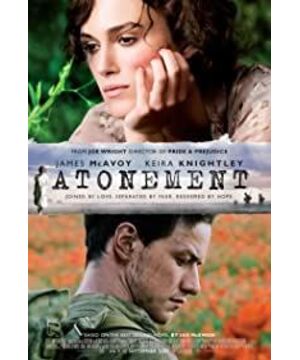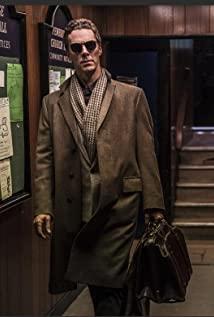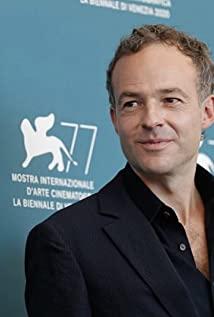I will return. Find you, love you, marry you and live without shame. ——Excerpt from
"Atonement"
Old manor, flat lawn. Fountain and flower stand, wallpaper with spread pattern. The pale master drank afternoon tea, and the freckled little girls whispered. It's the English country life scene that director Joe Wright shows you at the beginning of Atonement.
A suave yet frivolous picture. The slightly old-fashioned tone of the film is filled with languid emotions, as well as a hidden coldness and unease. Sad stories always give off signs like sweat. can be felt. Nervous eyes, slightly restrained breathing. Depressed background music. The sharp, powerful strokes of an old typewriter. Subtle character relationships, trivial and subtle dialogue. Narrative shots with interlaced dual perspectives take on the task of analyzing these signs with countless hesitations and doubts from the audience.
The season is summer. Nearly 1/2 of the time takes place in the summer when the girl Briony is thirteen years old. The misunderstandings that had arisen from a quick glance out the window that day, slowly magnified over time, inadvertently destroying the futures of sisters Cecilia and Robbie. The director constantly stops time at certain points and replays it from different perspectives. Presenting Briony's fantasy world, her thoughts on this transitional time between childhood and adulthood. In those hallucinations, misunderstandings obviously need no reason.
The retelling of the story is not easy. The scene changes from the English manor in 1935 to the Dunkirk retreat in 1940, from the military hospital in London during World War II to the confession of Briony, who has become a famous writer in 1999, facing the media. The unexpected jumps and overlaps in the film’s narrative sometimes make it impossible to tell the line between the imaginary world and real life.
"When I am truly saddened, my only consolation is to love and be loved," says the sensitive Proust.
In the beginning, there was love. From Briony, the storyteller's background in the writer's imagination, to her observations about the dramatic love affair between her sister and Robbie, and her crush on Robbie turning into jealousy and demonization. This is too complicated about the psychology of a 13-year-old girl, and it is so complicated that it affects the development of all subsequent stories.
The result of the first collision between a girl's inner world and real life is extremely tragic. The film's gradually slowing rhythm indicates growth and also shows helplessness. What was coming was the flames of war. Of course, a movie that relies on the lens and the scene to narrate is bound to be difficult to reflect the full-fledged brushstrokes in the original work. On the battlefield in ruins, Robbie recalls the last time he and Cecilia met in a coffee shop. After a short stay, Cecilia left a photo before leaving. This is a small house with white walls and blue windows by the sea. Hopefully he can take it with him during his campaign and remember to come home alive. Cecilia's words kept ringing in my ears: come back, come back to me. There was an air of numbness and heartbreak in the painful silence.
War is just the background of the film, just as empty space is the background of stars. Real world events are indeed only suitable as a foil to the story: the dark blue-toned picture, with mechanical certainty and indifference, flashes before the audience's eyes. War, life and death, are all a sudden dose of material, fueling the story. Helpless men and women are among them, and they are all finely chopped but bone-cutting mung beans and sesame seeds.
Towards the end of the film, Briony apologizes to her sister and her loved ones, releasing her pent-up emotions. But after the movie reassured the audience, it told everyone that it was just an illusion. That's just fiction in Briony's novel. Briony grew up feeling guilty, but couldn't change anything. Time and time again, she builds the reunion of Robbie and Cecilia in the fantasy of the literal world. After Robbie joined the army and left Cecilia, they never saw each other in real life. In July 1940, Robbie died of sepsis on the last day of the Great Retreat, still holding the photo in his hand as he died. In September of the same year, Cecilia died in an explosion at a subway station.
At a certain moment, I suddenly thought of a truth: when the movie started, it was actually the lie that quietly appeared. No one can avoid lying. Even if you finally find the true story of things, facing those who are alive, you can still only hover around the facts, but cannot directly penetrate into the details. So the director uses a lie to start the story. He will speak a certain truth in a fictional way. There are foreshadowings everywhere in the film. Those seemingly loose plots are a fusion of fiction and reality. It was only when I looked back at the end that I suddenly realized.
From the girl's cherishing of spring, to the cruelty of war and inner struggle, to the helplessness and calmness of old age, a real life suddenly appeared on the screen. Accidental mistakes in childhood, repentance for the rest of my life. Caring for the wounded, imaginary reconciliations, and fantasies of happy endings are all unbearable. The result of the atonement is that there is nowhere to atone, or that the act of atonement never really happens from beginning to end.
Self-imagined forgiveness cannot accomplish redemption in the true sense. The so-called atonement is just a ritual of inner expectations. So at the end of the film, Briony still exposed the lies he weaved, leaving the audience with a sad ending. The mistakes Briony made completely changed the lives of the three of them. She redeems herself by writing hard about her own mistakes. When she wrote the truth out, dust to dust, dust to dust, everything was finally relieved.
The truth is your inner peace. We are thus redeemed.
View more about Atonement reviews











